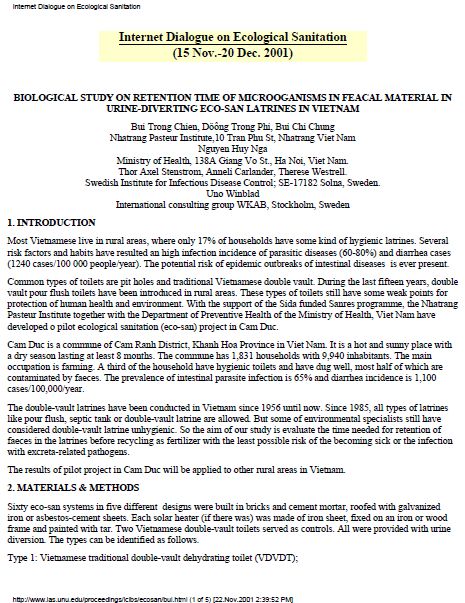Biological study on retention time of microorganisms in faecal material in urine-diverting eco-san latrines in Vietnam - Internet Dialogue on ecological sanitation
Chien, B. et al. (2001)

Published in: 2001
Author:
Chien, B. et al.
Uploaded by:
SuSanA secretariat
Partner profile:
common upload
5548 Views
39 Downloads
Content - Summary
Most Vietnamese live in rural areas, where only 17% of households have some kind of hygienic latrines. Several risk factors and habits have resulted an high infection incidence of parasitic diseases (60-80%) and diarrhea cases (1240 cases/100 000 people/year). The potential risk of epidemic outbreaks of intestinal diseases is ever present.
Common types of toilets are pit holes and traditional Vietnamese double vault. During the last fifteen years, double vault pour flush toilets have been introduced in rural areas. These types of toilets still have some weak points for protection of human health and environment. With the support of the Sida funded Sanres programme, the Nhatrang Pasteur Institute together with the Department of Preventive Health of the Ministry of Health, Viet Nam have developed o pilot ecological sanitation (eco-san) project in Cam Duc.
Cam Duc is a commune of Cam Ranh District, Khanh Hoa Province in Viet Nam. It is a hot and sunny place with a dry season lasting at least 8 months. The commune has 1,831 households with 9,940 inhabitants. The main occupation is farming. A third of the household have hygienic toilets and have dug well, most half of which are contaminated by faeces. The prevalence of intestinal parasite infection is 65% and diarrhea incidence is 1,100 cases/100,000/year.
The double-vault latrines have been conducted in Vietnam since 1956 until now. Since 1985, all types of latrines like pour flush, septic tank or double-vault latrine are allowed. But some of environmental specialists still have considered double-vault latrine unhygienic. So the aim of our study is evaluate the time needed for retention of faeces in the latrines before recycling as fertilizer with the least possible risk of the becoming sick or the infection with excreta-related pathogens.
The results of pilot project in Cam Duc will be applied to other rural areas in Vietnam.
Bibliographic information
Chien, B. et al. (2001). Biological study on retention time of microorganisms in faecal material in urine-diverting eco-san latrines in Vietnam - Internet Dialogue on ecological sanitation.
Filter tags
East Asia & Pacific English Urine diversion dehydration toilets (UDDTs)















